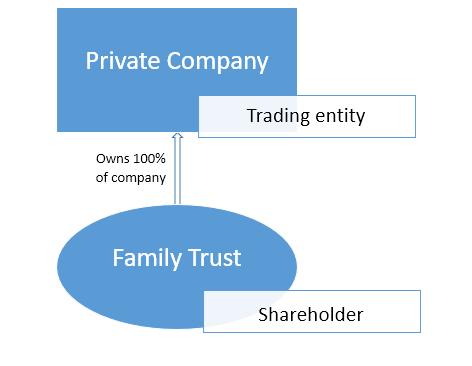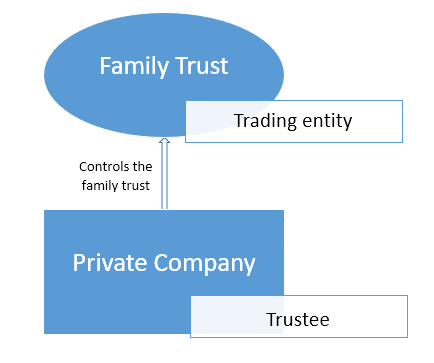Getting some structure in your life… (Part One)
Posted 22 May '19

Posted 22 May '19

“Brilliant thinking is rare, but courage is in shorter supply than genius” ~ Peter Thiel.
But you know what? You’ve already become one in a million; you’ve already mustered the courage to start your own business because you know that skill, that product or idea will make a difference. A difference to you, to your friends and to your community. Who knows, maybe even the world! But success is going to need a strong foundation. That foundation being your business structure.
Now I’ve been an accountant for the better half of a decade and you will hear all the different structures out there and the other bean counters argue about which one trumps the other. One accountant will say: “A private company is better as a business entity as you gain access to the corporate tax rate of 30% and it offers limited liability from creditors”. And the other will retaliate saying “No, a family (discretionary) trust is better as you can distribute profits to beneficiaries and protect you assets”. But, this is where the “Empire” strikes back as says: “it is not a competition!”
Ultimately, what is the more important characteristic or attribute is YOU. Because the business structure should be tailored made to suit the client. But if there is anything that we accountants and lawyers can all agree on, it is that the most optimal and ideal structure has at least one of each entity, depending on which is the trading entity.
Ideally, the best way to structure your business can be either achieved in either 1 of 2 ways:
1. A private company as the entity which conducts the business where the shares in said company are wholly owned by a family (discretionary) trust.

2. A family (discretionary) trust as the entity which conducts the business but with the company acting as the trustee of trust (e.g. corporate trustee)

But why do we do this? Why go to all this trouble of registering all these complex entities? Well, this effectively boils down to few key aspects; how much tax you are paying, risk management, capping your liability for claims and succession planning. You’ll almost feel like a big 4 bank! This is elaborated further below.
If there is anything that I can guarantee in the world, it is death and taxes; for which Australia has one of the most complex in the world second only to America. But what’s important when it comes to structuring is the tax on profits; because at the end of the day, it is the small business that are the bed rock of this economy. How tax minimisation can be achieved, at least through structuring, is the ability for that entity to provide the business with enough flexibility. Flexibility to use the corporate tax rate and flexibility to distribute to related family members to reduce and dilute your overall tax position. In an ever changing environment this is the key.
Risk is a critical consideration for all small to medium business owners. The risk associated with running a business has never been high with complex rules and regulations with a highly litigious environment. Whilst an important consideration in business is the accumulation of wealth, is it not also equally important to protect that wealth so you and your family can continue to enjoy the benefits of it? This is where asset protection comes into play. In a nutshell, asset protection is the ability to isolate valuable assets from risk or segregating multiple sources of risk to ultimately protect your pot of gold.
The ‘limited liability’ side of asset protection is simple. Limit your liability from stakeholders! Whether that be the bank, suppliers, customers, or any other party who might be eyeing off your money. Think of it like this, you are an insurance company for which someone has put in a claim. It is your business’s job to deny that claim. So the structure itself should have a mechanism to limit your personal exposure to that lawsuit. But ultimately, in the case that the claim succeeds, you are left unscathed. So from a structuring perspective, it is important that you have the protections under the Corporations Act to limit your exposure to your investment that you initially put in. Another way to think of this is the ‘fair go’ attitude. So you can have a crack at business and if it doesn’t necessarily go the way you plan, you can effectively ‘pull the plug’ and walk away from the business with limited recourse.
Now if you are a savvy business owner, you would understand that it is not about ‘you’. It is about your business legacy and what you want to pass on to your children, employees and your greater community. Because one day you will separate from your business. Whether this is planned (like bring in new owners) or unplanned (due to medical and health reasons) or simply that you want to hang up the mantle and try something else. It is inevitable. An effective structure thus allows you to pass on your business to the next generation with minimal tax and duty considerations.
Need assistance setting up your business structure? Please contact us today for a complimentary meeting 07 3124 0244
Already have an entity set up? Read Leonard’s further information on the problem with only having one entity in your structure HERE.
Leonard Jiang | CA, CTA, DFP
Senior Accountant
Tax Specialist
T 07 3124 0244 | E leonard@empireaccountants.com.au

When you plan with intention - and pair it with accountability - you’re not just hoping things will work out. You’re building a business that will.
.jpg)
Let’s face it; bookkeeping isn’t the most exciting part of running a business. However, it’s one of the most important! Keeping your financial records in check not only helps you stay on top of your business but moreover ensures you're meeting Australian Taxation Office (ATO) requirements without stress or penalties.